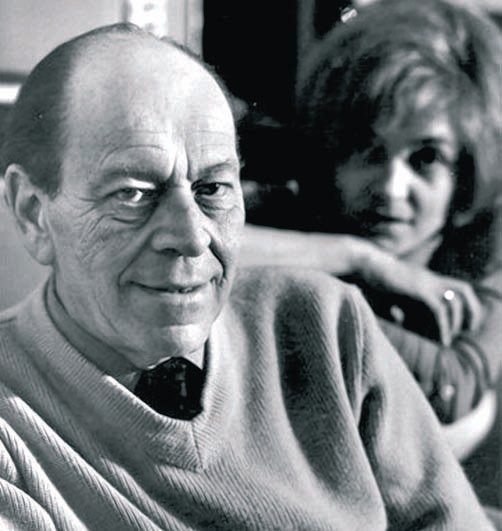Twentieth century Hungarian author István Örkény (1912-1979) was known for his bitingly sharp social commentary. As a Hungarian Jew, he survived the Holocaust and served in one of Hungary’s forced labour units during World War II, only to be captured by the Russians in 1943. István Örkény spent over two years in a Soviet labour camp, before being allowed to return to Hungary after the War. Following the suppression of the 1956 Revolution and the Soviet Union’s re-invasion of the country, he was banned from publishing for five years, as punishment for his very public support of the revolutionaries, and worked as an engineer in a factory during his silentium. István Örkény’s literary works reflect upon the turbulent twentieth century politics of Eastern Europe, the political shams that characterized the various regimes, as well as the grotesque pettiness, docility and quiet bitterness that permeated society.
As far as I could tell, his short story “Professors before the bench” is not available anywhere on the internet, hence my decision to type it up. The work resonates powerfully even in the present day, and HFP seems like an appropriate place to share the piece. It was translated by Judith Sollosy, and appeared in a print anthology entitled One Minute Stories (Budapest: Corvina, 1998).
C.A. / HFP
*
Professors before the bench
A court in Budapest has today brought down a verdict in the case of the State contra former college professor Géza Kashka-Kun and sixteen of his accomplices. The professor, whose fame has spread beyond the country’s borders, along with his gang of distinguished physicists, linguists, astronomers, historians, cybernetics experts and Sophia Schleinz, 24, a belly dancer who as La Paloma appeared nightly at the Damascus Bar & Grill, were charged with compiling, editing and distributing a two-volume abomination entitled The Great Hungarian Lexicon. The court charged that every word of the said lexicon was a fallacious phantasm devoid of any truth content whatsoever and furthermore, that its sole purpose was to mislead an unsuspecting public.
In his appeal the counsel for the defense pointed out the defendants’ clean records and impressive scientific accomplishments. He attempted to demonstrate that at such a high level of accomplishment, professional know-how can all too easily turn into its opposite. The court accepted only one attenuating circumstance, namely, that the lexicon forgers enjoyed no material gains from their publication.
In the view of the public prosecutor, the defendants’ educational background and scientific achievements just aggravated the arguments against them, in support of which he proceeded to read several entries from The Great Hungarian Lexicon. The scientists, writers and other public notables attending the hearing vented their outrage with loud cries of “phew!” We present some of the entries below.
Budapest: pop. 1,8 million. Founded by the weaver Antal Valero in 1776 as a silk works and built after blueprints by architect Hildin Valero. The rest did not turn out so well.
Literature: Medicinal water that surfaces on a swampy goose pasture, on the outskirts of the small country town of Pécel. Though effective in the cure of digestive and menopausal disorders, it may be counter-indicated for prostates. Those with hare-lip drink it with a straw, while healthy people are expressly warned against it.
Ethical world view: Like soccer, a mass sport engaged in by twenty-two participants. The viewers (sometimes in the tens of thousands), who are not bound by the rules themselves, egg the players on. It is no skin off their backs.
Hungary: A mania (med. fixa idea) with a population of ten million. It is now generally regarded as curable, though this would take away much of its charm.
Hegel, Georg Wilheilm Friedrich (1770-1831): German law student and father of several boys (the Young Hegelians). As a consequence of an equilibrium dysfunction, he could not tell the difference between up and down and so from time to time, had to be stood on his feet instead of his head.
Theatrical performance: A pleasant way to spend an evening, for which there is no Hungarian equivalent. (Ger: Zerstreuung, Fr: distraction, Eng: entertainment). A popular artistic experience elsewhere, at home it is generally regarded as a mild form of euthanasia.
Miklós Szabó (1897-1964): Telegram boy and until his retirement a file clerk. He never did anything of note. As the monographs written about him prove, he never had literary ambitions either. He was laid in state in the main hall of Parliament.
The court sentenced Kashka-Kun to eight years in prison. The other defendants received eighteen months each. Since she had no prior knowledge that the nude photo taken of her was to illustrate 75 entries of The Great Hungarian Lexicon, including the crowning of Queen Victoria, the Laws of Hammurabi and Louis Kossuth going in exile, Miss Schleinz was aquitted.
The verdict is up for appeal.
István Örkény




